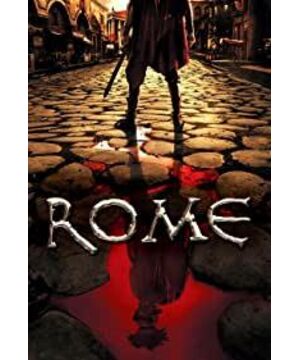(1) The Death of the Republic
Little classmate Li Zheng thinks that the most successful aspect of "Rome" is the fictitious image of two ordinary soldiers, Urenas and Polo, connecting their fate with the fate of the Republic and the new empire, and at the same time showing The real side of life in Rome at the time. In fact, from the first episode, Urenas’ tragic fate was clearly shown when he solemnly declared "for the republic". Although the "republic" is still like a "dictatorship" compared with the "monarchy" and "dictatorship". There are so many beautiful words, but the truth of history is that the Roman republic has been decayed at the end of the period, and it is full of bloody stench. Rome was an agricultural country. In the early days of the Republic, the distribution of land was fairly fair. The main producers were Roman citizens. The number of slaves was small, and the property differences among the various levels of society were not obvious. This was the commonwealth of the Senate, the guarantor, and the consul The ruling democratic system provides the basis for effective operation. And with the continuous development and expansion of this small country on the Tiber River until it turned the Mediterranean into its own inner lake, a large number of slaves and wealth rushed back to Rome along with the honor of the Roman soldiers. I still remember that Urenas followed Caesar returned from the battle of Gaul and took dozens of slaves to the slave market for sale. As a result, all the slaves died of edema. Only a little boy was sitting on the body of his relatives who had long been rancid. His eyes were neither grief, panic nor sluggish. At a loss, but very clear, it makes people worry. . . To put it far, in short, at the end of the Republic, the influx of a large number of slaves stimulated the development of the slavery economy on the one hand, and the growth of wealth on the other hand led to various social conflicts. The first is the contradiction between slaves and slave owners. When I was a child, I read Andersen’s fairy tales that the Spartacus uprising was the monstrous anger of a group of truly brave people. The anger in the fairy tale turned into the eruption of Mount Vesuvius and engulfed Rome, and this It's just a fairy tale. In reality, the oppression of slaves and foreigners in Roman territory has reached its peak at the end of the Communist Party of China. The second is the contradiction between Roman citizens and nobles. At that time, the nobles who occupied the Senate firmly adhered to the republican system. Of course, it was not the resounding slogan of "Republic", but to safeguard their own real interests. In the play, the leading political activist of the Senate, Cicero, had two in Alba. The estate, the three manors, was eventually stabbed to death by Polo in his beautiful manor. Urenas is a small civilian, but he refuses to face the decay and decline of the republican system under the control of the nobility, and insists on upholding the principles and ideals in his heart. What a tragic character and fate is obvious. He eventually fell with the death of the Republic.
(2) The rise of the empire
To quote Li Zhengxiao again, the only real politician in "Rome" is Octavian, and Anthony and Attia can only be regarded as unsophisticated political speculators. What about Caesar? I prefer to call him a hero. It is not enough to call him a hero if he is brave and good at fighting like Polo or as deep and experienced as Octavian. Or maybe there is no such thing as a hero at all. It is like Xiang Yu who has a grudge in his bones and pretends to be magnanimous. Seeing the truth about the hero, he will inevitably be disappointed. But I still want to at least leave this title to Caesar, no matter how false he accepted the surrender of the son of his former lover Ovilia. Caesar is still a hero, and a hero is a feeling. After the dictatorship of Caesar, the qualifications for the selection of elders were relaxed, the number of senior officials was increased, the citizenship was granted to the citizens of the province, the provincial system was reformed, the currency value and the calendar were reformed. People eventually stabbed Caesar to death, but Caesar's reforms did remain, which eased social conflicts and allowed more people to live a stable life.
And Octavian's political talents are indeed more outstanding. Elected as the "first citizen" under the banner of "restoring the republic", in fact, the head of state is a monarchy in the cloak of republic, but it is after all in line with the progress of the times. Since then, the Roman Empire has been established to defend the "Peace of Rome", so that the Romans can get rid of the suffering of war and begin to cultivate and live their lives. The most astonishing gossip in the play is undoubtedly the incestuous love between Octavian and his sister when he was a boy, which is laying the groundwork for his abusive tendency as an adult. In any case, this is a truly remarkable and rewriting history. The character, but not a wonderful character, I have controlled Anthony since I was a child. It is one thing to become a hegemony and build an empire, and it is another thing to live a good life and not make people feel disappointed. Although Anthony in "Rome" is portrayed rather absurdly, there is still a lot to say.
(3) The love of Bacchus
The people of Rome have always loved Anthony, calling him the incarnation of the god of wine. Dionysus, the god of Bacchus, is my favorite image of the gods, not only the favorite among the Greek gods, but also the Taishang Laojun, Yuanshi Tianzun, the Dragon King of the East China Sea, and the Great Sage of Qitian are all less lovely than the gods of Bacchus. Nietzsche divides art into two types, one is the art of the sun god, with the dazzling brilliance of reason, such as architecture and sculpture, and the other is the art of the wine god, which represents carnival, indulgence and madness, such as music and poetry. Anthony is called the God of Bacchus because of his unconcerned indulgence and the joy of fire fighting. This infinitely condemned as the degenerate happiness of this world is the source of the passion of Latin civilization. It is respected and loved by the Romans. I am still very much. It is hard to imagine that the religion of Christian culture, which is deeply bitter, ignoring the world, and pursuing the other side, is deeply rooted in the alternate influence of Latin and Greek culture. Regardless of the later generations, Antony's Rome worshipped secular happiness and pursued the enjoyment of the world. At that time, no one explained their religion better than Antony. Anthony in the play can't be considered very handsome, but he smiled with peachy eyes and a low voice and gentle eyes. . Charming. . Going further, Anthony is a bohemian, but he is afraid that he is the only one who loves among the political figures in the play. Anthony and Attia, the unethical love of two less-skilled political speculators, is it not just about using each other? Atiyah is not even a good person, and the things he did to pursue his family's interests, regardless of his daughter's happiness, are actually outrageous. But she still looks like a real person. When Caesar fought Pompeii to rush to Anthony, Attia once persuaded Anthony to stay in Rome and watch the gaffe and change before making a decision. Anthony was hesitant at first, but after hearing Attia’s advice, he got up and slapped her and immediately followed Caesar. And then, when Caesar returned to Rome triumphantly, and met at several banquets, both of them pretended to be cold and finally could not bear it for a few days before reuniting. I think this is love. It is not pure, not beautiful, if you look carefully, there are some ugliness, but this is love, and mortals can only do this. The so-called innocence is inevitably a bit false. It is not that you live to be cynical at this age, but that in this world, pure things inevitably become the first sacrifices. It is inevitable that this is the case. Therefore, Anthony was stopped by Octavian soldiers in front of Attia’s house before leaving, shouting Attia’s name, the two people’s farewell, although there was nothing, you think about Anthony at the time when Attia’s daughter was in name. Husband, it is inevitable to be a little disgusting, but that's it, it's very close to love.
Of course Anthony and Cleopatra, think about how many tears I shed when I watched this "Anthony and Cleopatra" in junior high school. So far I still think this is Shakespeare’s best historical drama, more than the four tragedies. nice. It's a pity that Cleopatra in "Rome" is very different from what I had previously imagined, and with Attia's presence, there is another layer of grievance in my heart. But Anthony does seem to love her to the point of fainting and giving the land of Rome as a gift to the queen, a man who provokes the resentment and anger of the Roman people. In the end, the struggle failed and was forced to death by Octavian in the palace of Alexandria. So don't talk about it.
In fact, when you look at history, what you pay attention to does reflect your personality. I have always paid the most attention to love entanglements and beauty heroes. Love is in my heart, and this change cannot be changed. I envy a certain elementary schoolmate who loves to watch political struggles and social changes. When the film "Rome" is released, only love is used as a supporting role.
(4) Gladiators
also said that Li Zheng’s junior, Li Zheng and LX both said that their favorite scene in "Rome" was that at the end of the first season, Polo was sentenced to death and killed more than a dozen gladiators on the execution ground. Renas also bravely jumped onto the execution ground to join the battle. In the end, Polo was not only released, but the two became heroes praised by everyone in Rome. The scene of this period of gladiatorial fighting was real and bloody, and it made people excited. Although it was extremely beautiful, it was still shocking to think of the fighting system at that time. Spartacus was the Roman prisoner of war who was sent to the gladiator school and couldn't stand the inhumane abuse among them before starting the uprising. The killings of Urenas and Polo are like chopping melons and vegetables. In every fighting scene, on the one hand, I am afraid that they will be injured. These two people resolved.
Speaking of this, it is really interesting to think of the media at the time. The decree of the Senate and the head of state is read by a fat man every day in front of the Senate, but he is not unemployed regardless of the party or government. The other gossip is the spread of small murals on the wall. Caesar and his lover Ovilla had a good relationship with him. Attia sent people to paint their good deeds on the wall everywhere, so that everyone in Rome knew it. Caesar did it for his reputation. Had to leave Gentle Town to expedition to Gaul. The heroic deeds of Urenas and Baltic were also painted on the walls, and it didn't take long for the city to be known. This is very interesting.
(5) Cicero, the law
I always feel that the most inconsistent with historical reality in "Rome" is Cicero. Cicero was originally a great eloquent, political activist, philosopher, jurist, and essayist. He was the first to translate Greek philosophy into Latin and introduced it into the Roman world. His contribution to Neo-Plato’s theory was not small. In other words, the reason why Christianity was able to spread in the Latin world was mainly because of the transformation of Christianity by Neo-Platoism. Although Cicero surrendered to Caesar after the defeat of Pompeii, he should never be like the jumping clown portrayed in the play. His political stance is not firm. Whoever has the force will cringe and steal under threats, especially by Anthony. The trembling part was really a bit unbearable. I still like Cicero very much. I am disappointed to play him like this.
When he mentioned Cicero, he followed Roman law. Cicero was born in a knight's family, and his family background is incomparable with other politicians, but he gained a reputation for daring to defend small people when he was young. I still remember that before Polo was sentenced to death, Octavian sent someone to help him find someone to defend. The tradition of the defender at that time was very similar to that of lawyers in modern Western justice. Of course, the defender mainly relied on eloquence rather than paying attention to the law. program. Roman law established the sacred tradition of private law since the Republican period, and the sanctity of the effectiveness of contracts and agreements was protected, and it was strengthened after the Augustine era. When Urenas first left the army and planned to open a shop, he made a contract with his neighbors. The private law tradition may be one of the most valuable treasures of Roman culture.
(6) The fate of mortals: humanistic feelings.
Before starting to watch "Rome", Xiaoli Li predicted that Polo would be my favorite image. Sure enough, who can not like Polo? It’s just that this man with infinite power and sincere and beautiful emotions stood tall in that era. It seemed unusually lonely and even a little unreal. Compared with the times, he was too advanced. He was a humanist temperament and compassionate feelings. It's too advanced. He would fall in love with his slave because he felt calm when he looked at her. He would ransom his slave to marry her instead of just possessing him. When he learned that the female slave had another lover, he would kill the rival by the wrong hand. But afterwards, he regretted himself to abandon himself and begged to die. Of course there is also his brotherhood with Urenas.
However, in the world of "Rome", he is inevitably beautiful and not real.
View more about Rome reviews











